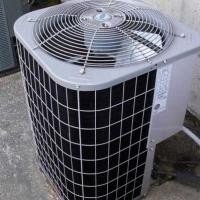
Sizing Up HVAC Prices: How to Choose the Right Air Conditioner
Find Out Where YOUR Home is Losing Energy:
When comparing different air conditioning units, you may notice a wide variation in prices. There are many reasons why, as various factors can swing the price up or down by thousands of dollars. How do you make sure you understand air conditioner prices – what makes a quality unit and how do you get the best deal?
Some of the main factors that directly impact the price of different models, and may influence which one you choose include: the size of the unit, its initial cost, and how much it will cost to operate on a monthly basis.
A quality unit will cost more initially, but save you more in the long run because it is more energy efficient. But that's only the beginning. HVAC units are highly durable and can last for more than two decades. This is where you can see the benefits of the field's advancing technology: the higher initial cost of an energy-efficient air conditioner will be more than offset by the long-term savings on your electrical bills. Finding a balance between long-term savings and initial cost can pose both a trouble and a challenge, although understanding all the factors involved will help you in your decision-making.
Apart from brand names, there are several other variables that play a key role in cost setting. There is a huge variety of air conditioners on the market: for example, some of the newer models can adjust a building's temperature through a cell phone app, while others possess features like multiple stages, allowing you to decide how strongly or efficiently your unit operates. Added benefits like these can bring a significant hike in the cost.
The efficiency of a unit is a major factor in its price: more efficient units tend to be higher-priced, but provide greater savings over the long run.
SEER’ing Heat: The Guide to Cool
Efficiency - The "efficiency" of an air conditioner refers to the quantity of energy being converted into cool air in comparison to the energy consumed. Efficiency is expressed using the Seasonal Energy Efficiency Ratio (SEER). A highly-rated SEER will result in lower utility costs to operate on a daily basis.
SEER ratings range from 13 to 23. Some older models may have a SEER rating below 13, but by law the minimum rating on newly manufactured air conditioners must be above 13.
Other Factors to Consider
Apart from an air conditioning unit's price, there are a variety of other factors to consider. First, your HVAC contractor needs to determine what size unit and which energy efficiency rating you need to purchase to effectively heat and cool your building.
One of the most accurate methods to find out the best rating to meet your needs is to use an “efficiency calculator.” In order to get the most accurate information, you should determine your local electricity costs (dollars/kilowatt hour) along with the initial price of the HVAC unit you're considering. The energy employed by the air conditioner per hour will define the units’ efficiency rating. Energy Star is the recommended efficiency calculator for advanced air conditioning technology.
Installation - The price of HVAC installation depends on your home's existing structure. Get estimates from more than one qualified contractor, as installation quotes can vary. If your home isn't already fitted for central air, the job will be more complex as the contractor will have to install ductwork and vents. This is just one of the reasons that installation costs can vary widely.
Bigger the House, Greater the Price
When it comes to size, accuracy matters. Bigger is not always better! The size of your house is the most obvious factor to take into consideration. When determining the appropriate size for your potential AC unit, your house's square footage is one of the most important variables. You also need to take into account the position and size of the windows, how much direct sun the structure gets, and how much insulation is already installed.
The number of inhabitants may also influence both the cooling and heating needs. A house with more inhabitants will naturally keep the house warmer, thanks to body heat, while a larger house with less people may require more of a boost from the heater. Electrical equipment and home appliances generate heat, and if a house if stuffed with hot lights or appliances that are often on working mode, then a strong air conditioner is even more crucial.
Quality contractors will calculate your home's cooling needs, including things like heat-gain and energy load calculations. This is the most reliable method to determine your HVAC needs because it takes into account almost every possible factor.
Experienced air conditioning contractors take everything into account, beginning with an overall survey of the house and checking all the variables, including issues that amateurs usually overlook.
With this information and the help of a reputable, certified HVAC contractor, you can choose the size and model HVAC unit that is right for your family and your home's needs.
Other HVAC solutions:
- HVAC Maintenance: Tips to Keep Your Equipment Running
- What is HVAC? HVAC is an acronym that stands for Heating, Ventilation and Air Conditioning.
- Who Invented Air Conditioning? Air conditioning is a modern convenience that we take for granted.
- How to Choose an HVAC Contractor This article will help you choose an HVAC Contractor.
- Superior HVAC Energy Efficiency By Upgrading Your HVAC System…And Other Fixes
- HVAC: What is it? The Basics Explained
- HVAC Design: The Importance of Properly Sized HVAC Equipment
- HVAC / Air Conditioning: A Quick Primer and History
- Sizing Up HVAC Prices: How to Choose the Right Air Conditioner
We were unaware of what was involved in an energy audit and your audior took the time to explain everything. We were impressed with the report which told us the areas in which we need to take action on. He never pressured us to use any particular contractors, he just suggested that we go to the Building Energy Pros web site to select contractors of our own choice. He did an excellent job and we HIGHLY recommend the Building Energy Pros. We already have recommended them to several of our neighbors. Again, EXCELLENT JOB!
Cynthia Simpson
The Building Energy Pros auditor was very knowledgeable. I was VERY HAPPY with him. He promptly E-mailed my energy audit report to me and I will consider all of his recommendations.
Tom McGee
We found out that our house really has no energy problems. We are happy to know that we
Leslie Stewart
I was very satisfied with your energy auditor. He was very qualified and spent a great deal of time with me. The energy audit was very informative.
P.B.
The energy auditor was very good and helpful. He keeps in touch with me to answer any of my questions.
D.G.
I was very satisfied with my energy audit. The auditor gave me some tips on attic insulation that were very helpful.
R.G.
I was very satisfied with my energy audit. Thank you!
R.S.
Very good service! I am going to replace the windows as the auditor had suggested.
D.W.
I was very happy with the energy audit. THANKS!
A. M.
My energy audit was very helpful. Joe Dempsey, your auditor, identified some structural problems that I was not aware of and explained to me why I need more insulation.
J. F.
The auditor was EXCELLENT! He spent ALOT of time with me. I am going to take 3 to 4 of his suggestions and correct these small items to save on my energy bills.
M. B.
The auditor did a GREAT JOB! He knew a lot about older homes, which we have. The report was very comprehensive. Thank you!
Vicki Nez/at
Your energy auditor was very nice and helpful. He answered all of our questions. We will recommend Building Energy Pros to our friends and neighbors.
Katherine McCaffrey
The auditor did a TERRIFIC JOB! The report was FANTASTIC! I will make all the repairs he suggested. I will definitely recommend him to everyone I know that could benefit from a home energy audit.
Steve Sleigh, Chevy Chase
The energy auditor was very professional and I am very satisfied with both the energy audit and the report I received. I will be referring the Building Energy Pros.
Tim Clary
I was very satisfied with the auditor. He was great and gave me some very valuable information. I will refer him to people I know who may need a home energy audit.
Willie Gantt
Your home energy audit proved to be very informative and helpful. I was not aware of the updraft created inside our walls because of the balloon framing construction. You said that that can cause heat to be pulled out of the house with the draft going up inside the walls and should be re-mediated. You also said that the attic insulation was insufficient and that fiberglass batts can leave spaces for around the edges causing heat loss and that it should have blown in insulation on top of what was there to seal the whole attic and increase the r factor. After going over your findings and telling me how you would fix the problems you told me how I could do it myself with stuff from the Home Center and for a quarter of the cost. Well, I did. I went into the basement and filled the bottom of the wall joist with unfaced insulation where they set on the sill plate. I then cut one inch foam board the size for each space and set it in and the sealed the edges of that with expanding foam as well as the sill plate to the foundation. I also sealed the sill plate to the foundation where the joist ran along it, as well as the top of those joist where it made contact with the subflooring. Next I went to the home center and rented their blown insulation machine and got ten bales of the insulation. I filled the attic on top of the batt insulation with about six inches giving another r-19 factor on top of the r-19 that was there. You said that the blown in would also help seal the heat loss around the edges of the batt. The work in the basement cost $144.00 and the work in the attic cost $328.00. After the 30% federal energy tax credit it will end up costing me about $330.00, which you said I should recover in savings in the first year. Thank You for all your advice and expertise. You made me aware of things I should consider and did.
Tommy Thompson


